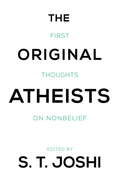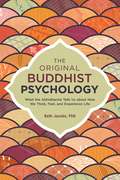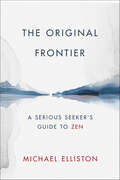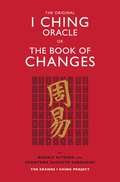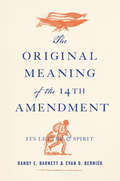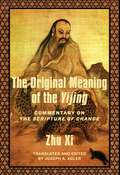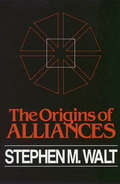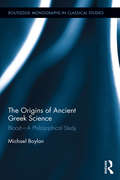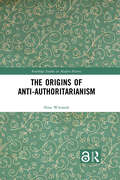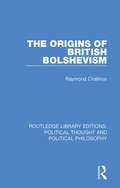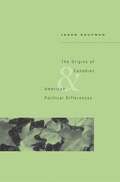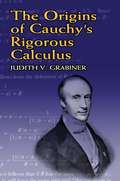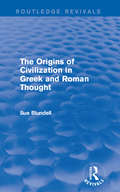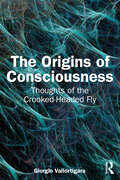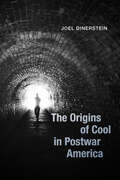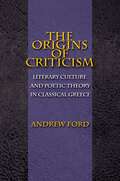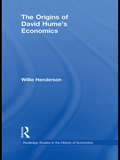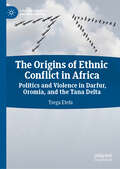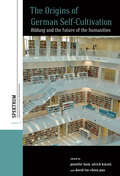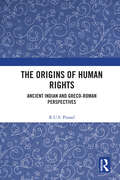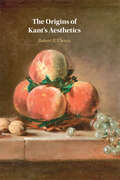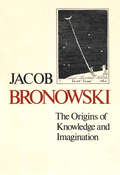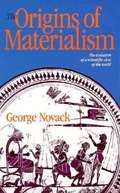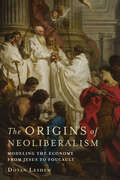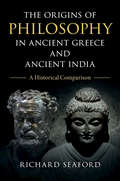- Table View
- List View
The Original Atheists
by S. T. JoshiThis is the first anthology ever published to feature the writings of leading eighteenth-century thinkers on the subjects of atheism, religion, freethought, and secularism. Editor S. T. Joshi has compiled notable essays by writers from Germany, France, England, and early America. The contributors include Denis Diderot (a principal author of the multivolume French Encyclopédie), Baron d'Holbach (System of Nature, 1770), Voltaire (Philosophical Dictionary), David Hume, Immanuel Kant, Thomas Jefferson, James Madison, Ethan Allen, Thomas Paine, and other lesser-known thinkers. With a comprehensive introduction providing the intellectual and cultural context of the essays, this outstanding compilation will be of interest to students of philosophy, religious studies, and eighteenth-century intellectual history. From the Trade Paperback edition.
The Original Buddhist Psychology: What the Abhidharma Tells Us About How We Think, Feel, and Experience Life
by Beth JacobsThe Abhidharma, one of the three major text collections of the original Buddhist canon, frames the psychological system of Buddhism, explaining the workings of reality and the nature of the human mind. It is composed of detailed matrixes and lists that outline the interaction of consciousness and reality, the essence of perception and experience, and the reasons and methods behind mindfulness and meditation. Because of its complexity, the Abhidharma has traditionally been reserved only for academic or monastic study; now, for the first time, clinical psychologist Beth Jacobs brings this dynamic body of work to general readers, using practical explanation, personal stories, and vivid examples to gently untangle the technical aspects of the Abhidharma. Drawing on decades of experience as both a therapist and a Buddhist, Jacobs illuminates this classic area of Buddhist thought, highlighting the ways it can broaden and deepen our experience of the human psyche and offering profound insights into spiritual practice.
The Original Frontier: A Serious Seeker's Guide to Zen
by Michael EllistonA practical and accessible manual for integrating Zen practice into everyday life without disrupting your routine. Throw open the gate to the original frontier of your creative mind discovered by Buddha, handed down to successive generations through India, China, and Japan, and now to America, in this age of increasing uncertainty. This always contemporary practice holds the key to surviving, and thriving, in trying times. Zen priest Michael Elliston&’s refreshing approach lays out the irreducibly simple method of Zen meditation in easily accessible terms and digestible bites. He covers everything from how Zen differs from popular meditations to designing a contemporary Zen life, and effective workarounds for all your excuses. Based on sound principles of direct sensory immersion, simply sitting still enough for long enough, this user&’s manual for Zen is presented step by step, encompassing personal dimensions of practice, as well as social implications for yourself and others. Zen enables you to embrace ambiguity in daily life, and to enjoy benefits to your health and happiness.
The Original I Ching : The Eranos I Ching Project
by Rudolf Ritsema Shantena Augusto SabbadiniOften referred to as the Eranos edition, this revised and updated translation offers the most substantial advance in I Ching since Richard Wilhelm introduced the oracle to the West in the 1920s.The I Ching is one of the oldest Chinese texts and the world’s oldest oracle. Accumulated from over 2,500 years of diviners, sages and shamans and born out of the oral tradition, the I Ching as we know it today is a collection of texts, imagery and advice, philosophy and poetry, divided into 64 chapters. There are 64 hexagrams, created from a collection of six lines, either broken or solid. In order to “read” from the book, you must cast a hexagram. The traditional method required yarrow sticks but nowadays is based on tossing three coins six times.The Original I Ching Oracle or Book of Changes was inspired by Carl Gustav Jung's insights into the psyche and researched for more than 60 years through the Eranos Foundation of Switzerland. It presents the oracular core of the I Ching as a psychological tool: the symbols interact with our minds in the same way dream images do.
The Original Meaning of the Fourteenth Amendment: Its Letter and Spirit
by Randy E. Barnett Evan D. BernickA renowned constitutional scholar and a rising star provide a balanced and definitive analysis of the origins and original meaning of the Fourteenth Amendment. Adopted in 1868, the Fourteenth Amendment profoundly changed the Constitution, giving the federal judiciary and Congress new powers to protect the fundamental rights of individuals from being violated by the states. Yet, according to Randy Barnett and Evan Bernick, the Supreme Court has long misunderstood or ignored the original meaning of the amendment’s key clauses, covering the privileges and immunities of citizenship, due process of law, and the equal protection of the laws. Barnett and Bernick contend that the Fourteenth Amendment was the culmination of decades of debates about the meaning of the antebellum Constitution. Antislavery advocates advanced arguments informed by natural rights, the Declaration of Independence, and the common law. They also utilized what is today called public-meaning originalism. Although their arguments lost in the courts, the Republican Party was formed to advance an antislavery political agenda, eventually bringing about abolition. Then, when abolition alone proved insufficient to thwart Southern repression and provide for civil equality, the Fourteenth Amendment was enacted. It went beyond abolition to enshrine in the Constitution the concept of Republican citizenship and granted Congress power to protect fundamental rights and ensure equality before the law. Finally, Congress used its powers to pass Reconstruction-era civil rights laws that tell us much about the original scope of the amendment. With evenhanded attention to primary sources, The Original Meaning of the Fourteenth Amendment shows how the principles of the Declaration eventually came to modify the Constitution and proposes workable doctrines for implementing the key provisions of Section 1 of the Fourteenth Amendment.
The Original Meaning of the Yijing: Commentary on the Scripture of Change (Translations from the Asian Classics)
by Xi ZhuThe Yijing (I Ching), or Scripture of Change, is traditionally considered the first and most profound of the Chinese classics. Originally a divination manual based on trigrams and hexagrams, by the beginning of the first millennium it had acquired written explanations and a series of appendices attributed to Confucius, which transformed it into a work of wisdom literature as well as divination. Over the centuries, hundreds of commentaries were written on it, but for the past thousand years, one of the most influential has been that of Zhu Xi (1130–1200), who synthesized the major interpretive approaches to the text and integrated it into his system of moral self-cultivation.Joseph A. Adler’s translation of the Yijing includes for the first time in English Zhu Xi’s commentary in full. Adler explores Zhu Xi’s interpretation of the text and situates it in the context of his overall theoretical system. Zhu Xi held that the Yijing was originally composed for the purpose of divination by the mythic sage Fuxi, who intended to create a system to aid decision making. The text’s meaning, therefore, could not be captured by a single commentator; it would emerge for each person through the process of divination. This translation makes available to the English-language audience a crucial text in the history of Chinese religion and philosophy, with an introduction and translator’s notes that explain its intellectual and historical context.
The Origins of Alliance (Cornell Studies in Security Affairs)
by Stephen M. WaltHow are alliances made? In this book, Stephen M. Walt makes a significant contribution to this topic, surveying theories of the origins of international alliances and identifying the most important causes of security cooperation between states. In addition, he proposes a fundamental change in the present conceptions of alliance systems. Contrary to traditional balance-of-power theories, Walt shows that states form alliances not simply to balance power but in order to balance threats. Walt begins by outlining five general hypotheses about the causes of alliances.Drawing upon diplomatic history and a detailed study of alliance formation in the Middle East between 1955 and 1979, he demonstrates that states are more likely to join together against threats than they are to ally themselves with threatening powers. Walt also examines the impact of ideology on alliance preferences and the role of foreign aid and transnational penetration. His analysis show, however, that these motives for alignment are relatively less important. In his conclusion, he examines the implications of "balance of threat" for U.S. foreign policy.
The Origins of Ancient Greek Science: Blood—A Philosophical Study (Routledge Monographs in Classical Studies #22)
by Michael BoylanThis book examines the origins of ancient Greek science using the vehicles of blood, blood vessels, and the heart. Careful attention to biomedical writers in the ancient world, as well as to the philosophical and literary work of writers prior to the Hippocratic authors, produce an interesting story of how science progressed and the critical context in which important methodological questions were addressed. The end result is an account that arises from debates that are engaged in and "solved" by different writers. These stopping points form the foundation for Harvey and for modern philosophy of biology. Author Michael Boylan sets out the history of science as well as a critical evaluation based upon principles in the contemporary canon of the philosophy of science—particularly those dealing with the philosophy of biology.
The Origins of Anti-Authoritarianism (Routledge Studies in Modern History)
by Nina WitoszekThis book discusses the ongoing revolution of dignity in human history as the work of ‘humanist outliers’: small groups and individuals dedicated to compassionate social emancipation. It argues that anti-authoritarian revolutions like 1989’s ‘Autumn of the Nations’ succeeded in large part due to cultural and political innovations springing from such small groups. The author explores the often ingenious ways in which these maladapted and liminal ‘outliers’ forged a cooperative and dialogic mindset among previously resentful and divided communities. Their strategies warrant closer scrutiny in the context of the ongoing 21st century revolution of dignity and efforts to (re)unite an ever more troubled and divided world.
The Origins of British Bolshevism (Routledge Library Editions: Political Thought and Political Philosophy #13)
by Raymond ChallinorFirst published in 1977. This book describes the growth of revolutionary organisations in Britain from 1900 onwards. It shows that there was an indigenous movement that developed quite independently from the left in other countries, although its basic outlook was remarkably similar to that of the Bolsheviks in Russia. The study concentrates the activities of the Socialist Labour Party, a small group of dedicated revolutionaries, whose impact on working-class politics had not been fully recognised. The most controversial section of the book deals with the Russian influence on the machinations that led to the formation of the British Communist Party. It is critical of Lenin, who sometimes gave advice on the basis of insufficient knowledge, and of Comitern agents, like Theodore Rothstein, with dubious political backgrounds. This title will be of great interest to students of politics, philosophy, and history.
The Origins of Canadian and American Political Differences
by Jason KaufmanWhy do the United States and Canada have such divergent political cultures when they share one of the closest economic and cultural relationships in the world? Canadians and Americans consistently disagree over issues such as the separation of church and state, the responsibility of government for the welfare of everyone, the relationship between federal and subnational government, and the right to marry a same-sex partner or to own an assault rifle.In this wide-ranging work, Jason Kaufman examines the North American political landscape to draw out the essential historical factors that underlie the countries’ differences. He discusses the earliest European colonies in North America and the Canadian reluctance to join the American Revolution. He compares land grants and colonial governance; territorial expansion and relations with native peoples; immigration and voting rights. But the key lies in the evolution and enforcement of jurisdictional law, which illuminates the way social relations and state power developed in the two countries.Written in an accessible and engaging style, this book will appeal to readers of sociology, politics, law, and history as well as to anyone interested in the relationship between the United States and Canada.
The Origins of Cauchy's Rigorous Calculus (Dover Books on Mathematics)
by Judith V. GrabinerThis text for upper-level undergraduates and graduate students examines the events that led to a 19th-century intellectual revolution: the reinterpretation of the calculus undertaken by Augustin-Louis Cauchy and his peers. These intellectuals transformed the uses of calculus from problem-solving methods into a collection of well-defined theorems about limits, continuity, series, derivatives, and integrals. Beginning with a survey of the characteristic 19th-century view of analysis, the book proceeds to an examination of the 18th-century concept of calculus and focuses on the innovative methods of Cauchy and his contemporaries in refining existing methods into the basis of rigorous calculus. 1981 edition.
The Origins of Civilization in Greek and Roman Thought (Routledge Revivals)
by Sue BlundellIt has been much disputed to what extent thinkers in Greek and Roman antiquity adhered to ideas of evolution and progress in human affairs. Did they lack any conception of process in time, or did they anticipate Darwinian and Lamarckian hypotheses? The Origins of Civilization in Greek and Roman Thought, first published in1986, comprehensively examines this issue. Beginning with creation myths – Mother Earth and Pandora, the anti-progressive ideas of the Golden Age, and the cyclical theories of Orphism – Professor Blundell goes on to explore the origins of scientific speculation among the Pre-Socratics, its development into the teleological science of Aristotle, and the advent of the progressivist views of the Stoics. Attention is also given to the ‘primitivist’ debate, involving ideas about the noble savage and reflections of such speculation in poetry, and finally the relationship between nature and culture in ancient thought is investigated.
The Origins of Consciousness: Thoughts of the Crooked-Headed Fly
by Giorgio VallortigaraThe Origins of Consciousness challenges the dominant view that consciousness is an emergent property of the complex human brain.Based on his pioneering research on a variety of organisms, Vallortigara argues that the most basic forms of mental life do not require large brains, and that the neurological surplus observed in some animals such as humans is likely at the service of memory storage, not of the processes of thought or, even less, of consciousness. The book argues for a simple neural mechanism that can provide the crucial event that brings into effect the minimum condition for subjective experience. Implications of the hypothesis for the appearance of consciousness in different organisms are discussed, as well as links with a variety of fascinating human phenomena such as disorders of consciousness, tickling and visual illusions.Challenging widely accepted theories of consciousness, the book is a must-read for students and researchers of human and animal consciousness.
The Origins of Cool in Postwar America
by Joel DinersteinAn “entertaining” study of the enduring concept of coolness, and the mix of cultures and historical events that shaped it (The New York Times).Cool. It was a new word and a new way to be, and in a single generation, it became the supreme compliment of American culture. The Origins of Cool in Postwar America uncovers the hidden history of this concept and its new set of codes that came to define a global attitude and style. As Joel Dinerstein reveals, cool began as a stylish defiance of racism, a challenge to suppressed sexuality, a philosophy of individual rebellion, and a youthful search for social change.Through portraits of iconic figures, he illuminates the cultural connections and artistic innovations among Lester Young, Humphrey Bogart, Robert Mitchum, Billie Holiday, Frank Sinatra, Jack Kerouac, Albert Camus, Marlon Brando, James Dean, and others. We eavesdrop on conversations among Jean-Paul Sartre, Simone de Beauvoir, and Miles Davis, and on a forgotten debate between Lorraine Hansberry and Norman Mailer over the “white Negro” and black cool. We come to understand how the cool worlds of Beat writers and Method actors emerged from the intersections of film noir, jazz, and existentialism. Out of this mix, Dinerstein sketches nuanced definitions of cool that unite concepts from African-American and Euro-American culture: the stylish stoicism of the ethical rebel loner; the relaxed intensity of the improvising jazz musician; the effortless physical grace of the Method actor. To be cool is not to be hip and to be hot is definitely not to be cool.“Eminently readable. Much more than just a history of cool, this book is a studied examination of the very real, often problematic social issues that popular culture responds to.” —Publishers Weekly (starred review)“The kind of book that makes learning enjoyable.” —The Wall Street Journal“Superb.” —Times Higher Education
The Origins of Criticism: Literary Culture and Poetic Theory in Classical Greece
by Andrew FordBy "literary criticism" we usually mean a self-conscious act involving the technical and aesthetic appraisal, by individuals, of autonomous works of art. Aristotle and Plato come to mind. The word "social" does not. Yet, as this book shows, it should--if, that is, we wish to understand where literary criticism as we think of it today came from. Andrew Ford offers a new understanding of the development of criticism, demonstrating that its roots stretch back long before the sophists to public commentary on the performance of songs and poems in the preliterary era of ancient Greece. He pinpoints when and how, later in the Greek tradition than is usually assumed, poetry was studied as a discipline with its own principles and methods. The Origins of Criticism complements the usual, history-of-ideas approach to the topic precisely by treating criticism as a social as well as a theoretical activity. With unprecedented and penetrating detail, Ford considers varying scholarly interpretations of the key texts discussed. Examining Greek discussions of poetry from the late sixth century B.C. through the rise of poetics in the late fourth, he asks when we first can recognize anything like the modern notions of literature as imaginative writing and of literary criticism as a special knowledge of such writing. Serving as a monumental preface to Aristotle's Poetics, this book allows readers to discern the emergence, within the manifold activities that might be called criticism, of the historically specific discourse on poetry that has shaped subsequent Western approaches to literature.
The Origins of David Hume's Economics (Routledge Studies in the History of Economics)
by Willie HendersonThe book covers Hume’s biographical development; his self appraisal as a 'man of letters’; his philosophical writings with emphasis on their direct and indirect economic content; his self-aware criticism of his approach to the Treatise and the development of his rhetorical understanding of the needs/interests of his readers/potential readers; his rhetorical turn and Ciceronian adjustments to his writing within the genre of the essay, including his two Enquiries; his political essays and his nine essays conventionally classified as economic. The work aims to show how the Treatise and its vicissitudes gave rise to his economics. The work takes a broad approach to Hume and his writings on economic topics from the Treatise, through the Enquires and on to his political and economic essay. The work also explores Hume’s textual method and charts the move from abstruse philosophy to a Ciceronian engagement with social conditions and problems as developed in the Political Discourses. In addition, Hume’s extensive use of analogies is also brought into clearer focus than is found in other texts. Overall, the book will be of great use to both postgraduates and undergraduates alike.
The Origins of Ethnic Conflict in Africa: Politics and Violence in Darfur, Oromia, and the Tana Delta (African Histories and Modernities)
by Tsega EtefaFrom Darfur to the Rwandan genocide, journalists, policymakers, and scholars have blamed armed conflicts in Africa on ancient hatreds or competition for resources. Here, Tsega Etefa compares three such cases—the Darfur conflict between Arabs and non-Arabs, the Gumuz and Oromo clashes in Western Oromia, and the Oromo-Pokomo conflict in the Tana Delta—in order to offer a fuller picture of how ethnic violence in Africa begins. Diverse communities in Sudan, Ethiopia, and Kenya alike have long histories of peacefully sharing resources, intermarrying, and resolving disputes. As he argues, ethnic conflicts are fundamentally political conflicts, driven by non-inclusive political systems, the monopolization of state resources, and the manipulation of ethnicity for political gain, coupled with the lack of democratic mechanisms for redressing grievances.
The Origins of German Self-Cultivation: <em>Bildung</em> and the Future of the Humanities (Spektrum: Publications of the German Studies Association #27)
by Jennifer Ham, Ulrich Kinzel, and David Tse-chien PanRecent devaluations of a liberal arts education call the formative concept of Bildung, a defining model of self-cultivation rooted in 18th and 19th century German philosophy and culture, into question and force us to reconsider what it once meant and now means to be an “educated” individual. This volume uses an arc of interdisciplinary scholarship to map both the epistemological origins and cultural expressions of the pivotal notion of Bildung at the heart of pursuit in the humanities. From its intriguing original historical manifestations to its continuing resonance in current ongoing debates surrounding the humanities, the editors urge us to ask and discover how the classical concept of Bildung, so central to humanistic inquiry, was historically imagined and applied in its original German context.
The Origins of Human Rights: Ancient Indian and Greco-Roman Perspectives
by R.U.S PrasadThis book studies the history of intercultural human rights. It examines the foundational elements of human rights in the East and the West and provides a comparative analysis of the independent streams of thought originating from the two different geographic spaces. It traces the genesis of the idea of human rights back to ancient Indian and Greco-Roman texts, especially concepts such as the Rigvedic universal moral law, the Upanishadic narratives, the Romans’ model of governance, the rule of law, and administration of justice. It also looks at Cicero’s concept of rights and duties which focuses on quality of compassion and fair play, and Seneca’s expositions on mercy, empathy, justice and checks on the arbitrary exercise of power. An important contribution, this book fills a significant gap in the study of human rights. It will be useful for students and researchers of political science, ancient history, religion and civilizations, philosophy, history, human rights, governance, law, sociology, and South Asian studies. The book also caters to general readers interested in the history of human rights.
The Origins of Kant's Aesthetics
by Robert R. ClewisOrganized around eight themes central to aesthetic theory today, this book examines the sources and development of Kant's aesthetics by mining his publications, correspondence, handwritten notes, and university lectures. Each chapter explores one of eight themes: aesthetic judgment and normativity, formal beauty, partly conceptual beauty, artistic creativity or genius, the fine arts, the sublime, ugliness and disgust, and humor. Robert R. Clewis considers how Kant's thought was shaped by authors such as Christian Wolff, Alexander Baumgarten, Georg Meier, Moses Mendelssohn, Johann Sulzer, Johann Herder, Francis Hutcheson, David Hume, Edmund Burke, Henry Home, Charles Batteux, Jean-Jacques Rousseau, and Voltaire. His resulting study uncovers and illuminates the complex development of Kant's aesthetic theory and will be useful to advanced students and scholars in fields across the humanities and studies of the arts.
The Origins of Knowledge and Imagination
by Jacob BronowskiAdapted from a series of lectures by Bronowski that deals with one of the pivotal paradoxes that has plagued scientific thought.
The Origins of Materialism: The Evolution of a Scientific View of the World
by George NovackAmerican communist politician and Marxist theoretician Novack (1905-1992) examines the first steps in the development of the materialist conception of the world, from its emergence among the Ionian Greeks through its elaboration in Greco-Roman society. The text is a sequel and supplement to Novack's earlier work, An Introduction to the Logic of Marxism, which outlined the main ideas of the dialectical method of thought but included minimal reference to the materialistic foundations of Marxism; this volume focuses on the materialistic roots of the Marxist outlook.
The Origins of Neoliberalism: Modeling the Economy from Jesus to Foucault
by Dotan LeshemDotan Leshem recasts the history of the West from an economic perspective, bringing politics, philosophy, and the economy closer together and revealing the significant role of Christian theology in shaping economic and political thought. He begins with early Christian treatment of economic knowledge and the effect of this interaction on ancient politics and philosophy. He then follows the secularization of the economy in liberal and neoliberal theory.Leshem draws on Hannah Arendt's history of politics and Michel Foucault's genealogy of economy and philosophy. He consults exegetical and apologetic tracts, homilies and eulogies, manuals and correspondence, and Church canons and creeds to trace the influence of the economy on Christian orthodoxy. Only by relocating the origins of modernity in Late Antiquity, Leshem argues, can we confront the full effect of the neoliberal marketized economy on contemporary societies. Then, he proposes, a new political philosophy that re-secularizes the economy will take shape and transform the human condition.
The Origins of Philosophy in Ancient Greece and Ancient India: A Historical Comparison
by Richard SeafordWhy did Greek philosophy begin in the sixth century BCE? Why did Indian philosophy begin at about the same time? Why did the earliest philosophy take the form that it did? Why was this form so similar in Greece and India? And how do we explain the differences between them? These questions can only be answered by locating the philosophical intellect within its entire societal context, ignoring neither ritual nor economy. The cities of Greece and northern India were in this period distinctive also by virtue of being pervasively monetised. The metaphysics of both cultures is marked by the projection (onto the cosmos) and the introjection (into the inner self) of the abstract, all-pervasive, quasi-omnipotent, impersonal substance embodied in money (especially coinage). And in both cultures this development accompanied the interiorisation of the cosmic rite of passage (in India sacrifice, in Greece mystic initiation).
